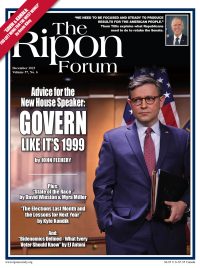
Are you better off than you were four years ago? President Ronald Reagan famously asked Americans that question in a debate with President Jimmy Carter, and Americans overwhelmingly answered “NO!” If the same question were asked today, you’d get the same response, because President Joe Biden’s policies have devastated Americans’ finances.
From his first hours in office, Biden has waged a relentless war against American energy, canceling pipelines, leases, and permits, while throwing up countless regulatory barriers. That has greatly increased the cost of energy, which has increased costs throughout the economy. But Biden’s spending agenda has been just as harmful, perhaps more so.
If Biden had simply done nothing upon taking office and allowed the one-time emergency spending from Covid to expire, the budget would be balanced by now. Instead, he has constantly pushed for more spending and has institutionalized multi-trillion-dollar annual deficits.
Compared to when Biden took office, Americans are paying 20 percent more for food and 38 percent more for gasoline. It also costs 28 percent more to keep your home warm this winter.
To pay for this runaway spending spree, the Federal Reserve created trillions of dollars out of nothing, which quickly devalued the currency in less than three years as inflation hit 40-year-highs. So, though many Americans earn more today, their larger paychecks buy them less. For 28 of the last 32 months, inflation has outpaced the growth of average weekly earnings.
This is devastating for American families. Compared to when Biden took office, they’re paying 20 percent more for food and 38 percent more for gasoline. It also costs 28 percent more to keep your home warm this winter. And these are the Biden administration’s own figures. People are demonstrably poorer.
Unable to make ends meet, a record number of Americans have resorted to getting second or third jobs. That’s also making the employment statistics look better than they are by increasing the number of payrolls without increasing the number of people employed. But even this isn’t enough for many Americans, who have depleted their savings and gone deeply into debt to keep the lights on.
Credit-card debt is at a record $1.1 trillion, and 25 percent of Americans haven’t paid off the debt they acquired from Christmas shopping — in 2022.
To bring down the stratospheric inflation rates it helped cause, the Fed has embarked on a belated series of interest rate increases which has imposed significantly higher borrowing costs on American families and businesses alike.
That means not only are people in a record amount of credit-card debt, but the interest rates on those credit cards are at a record high.
This combination of both prices and interest rates rising has completely frozen the housing market. The monthly mortgage payment on a median price home has doubled under the Biden Administration. It costs a family an extra $12,000 per year for the same house. Unless your income has doubled in less than three years, a house probably isn’t affordable for you. This is nothing short of a cost-of-living crisis.
For the typical American family, the combination of falling real earnings and higher borrowing costs has been equivalent to losing $6,800 in annual income.
But official inflation metrics don’t account for many regulatory costs that are imposed by the government, and those costs have exploded under Biden even faster than they did under President Barack Obama.
Just two years of regulatory rulemaking under Biden have cost the average American household about $9,600, compared to about $8,300 for the same time under Obama. Conversely, regulatory costs went down $11,000 for the average American household over the four years of Donald Trump’s presidency.
Just two years of regulatory rulemaking under Biden have cost the average American household about $9,600 … Conversely, regulatory costs went down $11,000 for the average household over the four years of Donald Trump’s presidency.
That means on the regulatory front alone, just two years of Biden have wiped out most of the gains the average household accrued during the previous four years.
Clearly, the failed policies of the last three years have hurt Americans, and it is particularly bitter that these have all been self-inflicted wounds. Fortunately, the terrible effects of these policies will be reversed if we simply reverse the policies themselves.
What, precisely, does that look like? First and foremost, Congress and the White House need to cut federal spending. That will help reduce both inflation and interest rates, bringing much needed relief to American families.
Second, the next president needs to roll back the burdensome overregulation of the Biden administration, which will further reduce costs while encouraging economic growth, job creation, and real wage growth. Ending the Biden Administration’s war on American energy will have the exact same effects.
America’s economic decline is not foreordained. It can be reversed if our leaders have the political will to do it. Americans should keep in mind that Biden clearly has no intention of reversing our decline, but accelerating it.
EJ Antoni is a public finance economist at the Heritage Foundation and a senior fellow at the Committee to Unleash Prosperity.




